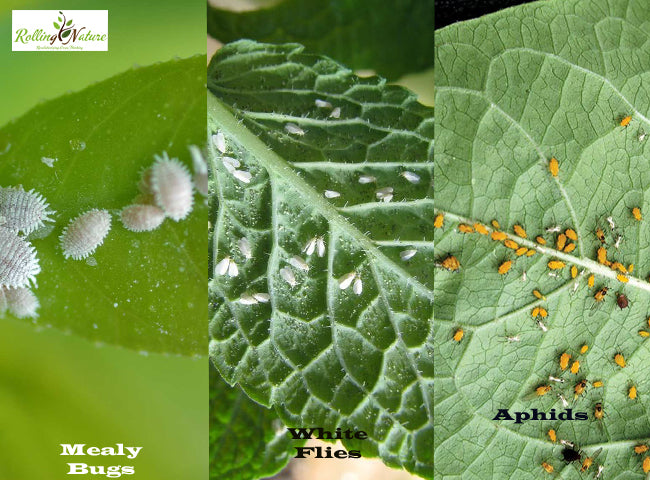We all love our plants! Don’t we! They are just like our family. It’s sad when we see a healthy plant developing some unusual changes. Do you want to maintain the health of your plant? Or, Are you struggling with a sick, damaged and diseased plant? It is likely that pests have attacked your houseplant. The problem can quickly spread to other plants. Here are some effective measures that will help you to tackle the problem. These solutions provided here come handy, you can make your own homemade pesticide with common stuff available at your homes. If you love your plants you will love this little pest & infection help guide from our plant experts. Sometimes plants show sickness symptoms due to deficiency of different nutrients, we will cover that in another article.
Preventive Care
The best way to prevent and stop insect activity is to take excellent care of your plants. All plants need food, water and sunlight to survive, but different plants require different amounts of each. For new plants, check the care label and follow the instructions. Over-watered, sickly plants that don't get enough light attract gnats and other insects, as well as mold and bacteria. Under-watering plants creates the perfect conditions for spider mites and arid-climate insects. Striking the right soil moisture balance is sometimes all you need to nip a bug problem.
Always keep in mind to wash the leaves of your plants once a week. . Dust and grime can also attract and harbor spider mites and other insect pests. Dust and grime on plants looks bad and it is also bad for the health of the plant. Why? Because dust clogs the pores of plant leaves, which makes it difficult for the plant to respire. In addition, dust partially blocks the sunlight before it reaches the plant. This considerably decreases the amount of photosynthesis in the plants deteriorating their health.
Always fertilize your plants at regular intervals; you can use an organic fertilizer. Make sure you also do the trimming and pruning of the plant to remove all unproductive plant parts and to enhance the plant growth.
Regular Check for Pests & Disease
Closely observe your plants regularly to find out any pests and disease attack. While you water your plants, always check both sides of the leaves for signs of pests or disease. Also, check the stem for any visible changes and symptoms. Identify the signs of plant pests such as mealy bug, scale insects, mites, aphids, caterpillars, etc.
If you see any kind of pests, or find pest damage, like chewed or stippled leaves, insect droppings, sticky leaves, or webbing, treat plants accordingly. The home remedies for treatments of plants for different types of pests are discussed later.
Isolation
First & foremost defense is to isolate. When an insect pest, or a disease attacks your plant, the problem can quickly spread to other plants. If you suspect anything, the first thing you should do is to isolate the plant for a couple of weeks. Keep it separately, away from your other healthy plants until you have eliminated the problem. Before bringing out the chemicals, try a few simple home remedies.
Home Remedies for Pest Control
A few of several safe household chemicals to use are dishwashing soap, shampoo rubbing alcohol (surgical spirit) and vinegar but you need to identify the problem to use a particular home remedy.
Larger insects can be removed by hand with your fingers or tweezers. For easily dislodged insects like aphids, crickets, mites, or spiders, try spraying them off with a stream or spray of water from the hose. The pressure of water will knock them down. If this doesn’t work for your plant try homemade soap solution.
Home made soap solution works well for all insects. Mix a teaspoon of baby shampoo in 1 liter of water. Mix it well and spray it generously on the plant. Do not spray in direct sunlight! To prevent injuries always wash the plants with fresh water after 3-4 hrs of application. Always do a test on a small area. Wait for 2-3 days to check any damage. Avoid using soaps on plants with hairy leaves and plants having waxy leaves. If baby shampoo is not available use normal shampoo (only half teaspoon in one liter). Vinegar is available mostly in all households. A mix of three-table spoon of vinegar in a liter of water can be sprayed on the plant to ward off pest effectively.
The oil and soap mix effectively works on aphids, spiders, mites, thrips, whitefly, lacebugs, scale and mealybugs.
Aphids look like small tapered bugs which can have orange, brown, green or black color.Generally, people think they are ants. Important: Remember to wash your plant with fresh water after 3-4 hrs of the treatment, to avoid injuries.

White flies look like rice at the first glance. For white fly eggs, check the undersides of leaves, especially the lower leaves, and, using a damp soapy sponge (use dishwashing liquid, one teaspoon in 1 liter water), gently wipe away the eggs (grayish-white ovals). Repeat the application every 3 or 4 days to eliminate the new whiteflies emerging from pupa. You can also try a mix of teaspoon of cooking oil and a teaspoon of baby shampoo/dishwashing liquid to one liter of water to spray on the plants. To trap whiteflies use a plastic yellow container coated with petroleum jelly.
If you feel there's a cottony build up under the leaves, or at the place of new growth or stems it can be a sign of start of mealy bug infection.The bugs are not visible at the onset, they grow later in size. A mild infestation of mealybug or scale can be treated with a rubbing alcohol, what is generally known as surgical spirit. Dip a cloth or cotton swab in rubbing alcohol and apply directly to the affected areas. Some fuzzy or very thin-leaved plants will be damaged by contact with rubbing alcohol, so test a leaf before treating the entire plant. You may also dilute the alcohol to avoid burning the plant parts. You may see a mealybug infestation as white cottony or fluffy attachments to the plant part. Mealy bugs generally infest citrus, grapes, mannihot and gardenia. Mealybugs treated plants should then be isolated and watched carefully for signs of re-infestation, removing any new pests until the population has been completely eradicated.
In case, you cant locate any visible insect activity on your plants, there are higher possibilities that the plant may have succumbed to a fungal infection. The plants with fungal infection loose their robustness and bright colors and get weaker day by day. Look for signs such as discolored patchy leaves and stems or change in shape of leaf. For plant diseases like powdery mildew (the condition in which leaves, especially new leaves, become twisted or curled and are covered with a white powder), botrytis (grey mold), black spot and other fungi, try using baking soda and dishwashing liquid mix. Dissolve half-teaspoon of baking soda in one liter of water and add a few drops of dishwashing liquid. Spray this mix on the foliage. As mentioned in other treatments, this also requires an after wash with fresh water after 3-4 hrs of application.
Powdery mildew and black spots on roses are commonly seen. If you suspect fungal infection on plant parts then you should remove the infected plant part immediately with care and don’t forget to isolate the plant for the treatment.
Neem works wonders, to get rid of plant pests and diseases. Boil neem leaves in water and spray the cooled down water on the plants. You may also use neem oil for the same. Neem based insecticidal sprays are also available in market.

Repotting
In cases of severe infestation, you may need to repot your plant. If this is the case, take your plant outside and work over an open trash bag. Remove the plant from its pot and shake off as much of the soil as possible, then seal up the trash bag. Avoid contact of the soil with other plants. Run the plant's stems, leaves and roots over running water to eliminate as much of the soil and as many of the insects as possible. Use a new pot or thoroughly clean your old pot with soapy water and a soft scrub brush. Repot using sterilized potting soil. You can prepare weed free soil, by pouring boiling hot water. Be careful while doing this, to ensure you don’t damage the plant and yourself. Boiling water kills all the seeds and weeds it touches. Vinegar also is an effective weed killer. Repotting is suggested once in an year for fast growing plants.
Reinfestation
If the repotting works for your plants, find time to monitor your plants regularly, to make sure the infestation hasn't returned. Treated plants should then be isolated and watched carefully for signs of re-infestation, removing any new pests until the population has been completely eradicated.
With all the tips provided above, we hope that you are now ready to identify and fight the pest attack on your plant. Your plant friend sometimes needs that extra care to thrive well and grow healthily. Take care of your “nature buddy” and yourself!
Happy Gardening!!
Author: Vandana Chaudhary
Join Initiative Earth by Rolling Nature. Preserving Biodiversity can stop future pandemics such as Covid-19. Launching Initiative Earth "LOVE NATURE" Campaign for World Environment Day 5th June, 2020. #LoveNature. We must rethink our relationship with nature. This coming month there will be plenty of action on this page.Follow us on FB Twitter & Insta. Join the revolution.
About Initiative Earth: After 7 years of contributing to the welfare of Earth Rolling Nature started Initiative Earth to proactively for earth to address environmental concerns & issues. We will actively engage with policy makers, organizations, communities and individuals so that best possible decisions are made and timely actions are taken for a secure and sustainable future of Earth. We wish to achieve this aim by spreading our motto of love, protect and nurture Earth. Spread the word for the revolution.#InitiativeEarth #RollingNature
About Rolling Nature: We provide complete customized green decor & green gifting solutions. Low maintenance live plants in exotic planters.Breathe Fresh! Bring Your Garden Indoors! Revolutionizing Green Thinking Since 6 Years!
Available on www.rollingnature.com Amazon, Flipkart, Pepperfry, Myntra & Snapdeal
Amazon Brand Store: https://amzn.to/2sHF7Cf
Rolling Nature Catalogue: Download Here
Request us the Price Menu Now at sales@rollingnature.com or call us at 8698407574. For any query write to us at care@rollingnature.com
Watch our Breathe Fresh Indoors Video at You Tube

